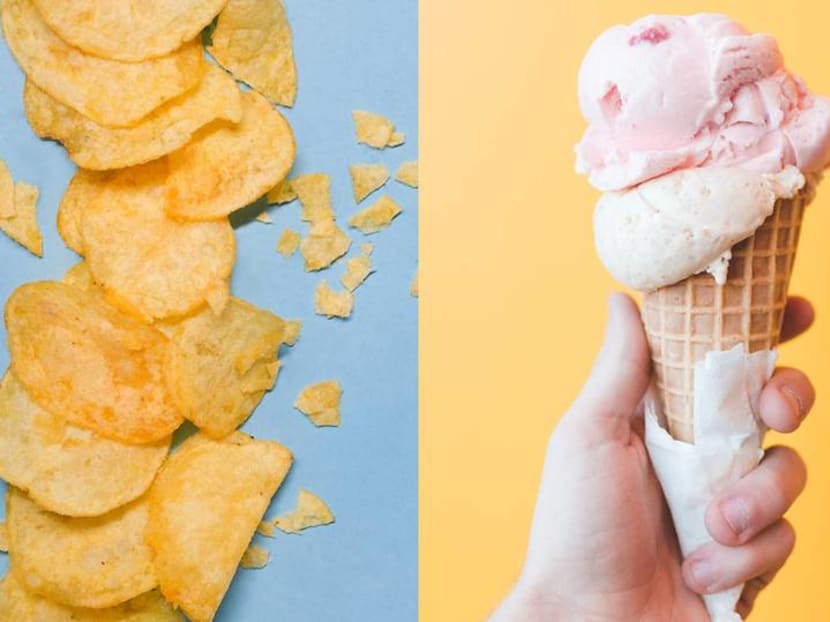Are potato chips and ice cream as addictive as cigarettes and alcohol?
Advertisement
Wellness
Are potato fries and ice cream equally addictive as cigarettes and alcohol?
Food researchers fence whether such highly candy foods are addictive, triggering our brains to overeat.

(Photos: Pexels/Alena Shekhovtcova and Unsplash/Ian Dooley)
Five years agone, a group of nutrition scientists studied what Americans consume and reached a striking conclusion: More than than half of all the calories that the average American consumes comes from ultra-processed foods, which they defined equally "industrial formulations" that combine big amounts of carbohydrate, table salt, oils, fats and other additives.
Highly candy foods keep to dominate the American diet, despite being linked to obesity, heart illness, Type 2 diabetes and other health problems.
They are cheap and convenient, and engineered to taste good. They are aggressively marketed past the nutrient industry.
But a growing number of scientists say some other reason these foods are so heavily consumed is that for many people they are not just tempting but addictive, a notion that has sparked controversy amid researchers.
READ: There'southward at present a list of Asian foods to look out for if you're worried nearly diabetes
Recently, the American Journal Of Clinical Nutrition explored the science behind food habit and whether ultra-candy foods might be contributing to overeating and obesity.
It featured a fence between two of the leading experts on the field of study, Ashley Gearhardt, associate professor in the psychology department at the University of Michigan, and Dr Johannes Hebebrand, head of the section of kid and boyish psychiatry, psycho-somatics and psychotherapy at the Academy of Duisburg-Essen in Germany.
Dr Gearhardt, a clinical psychologist, helped develop the Yale Food Addiction Scale, a survey that is used to make up one's mind whether a person shows signs of addictive behaviour toward food.
In one written report involving more than 500 people, she and her colleagues found that certain foods were peculiarly likely to elicit "addictive-like" eating behaviours, such as intense cravings, a loss of control, and an inability to cut back despite experiencing harmful consequences and a potent want to stop eating them.

At the top of the listing were pizza, chocolate, potato fries, cookies, ice cream, French fries and cheeseburgers. Dr Gearhardt has institute in her research that these highly processed foods share much in common with addictive substances.
Like cigarettes and cocaine, their ingredients are derived from naturally occurring plants and foods that are stripped of components that slow their assimilation, such as fibre, water and protein.
Then, their most pleasurable ingredients are refined and processed into products that are rapidly captivated into the bloodstream, enhancing their power to light up regions of the brain that regulate reward, emotion and motivation.
We are all ingesting highly candy foods, and none of u.s. is experiencing this contradistinct state of mind considering there's no directly hitting of a substance in the brain.
Salt, thickeners, artificial flavours and other additives in highly processed foods strengthen their pull past enhancing properties like texture and mouth-feel, similar to the mode that cigarettes incorporate an array of additives designed to increase their addictive potential, said Dr Gearhardt.
Menthol helps to mask the bitter flavour of nicotine, for instance, while another ingredient used in some cigarettes, cocoa, dilates the airways and increases nicotine's assimilation.
A common denominator among the most irresistible ultra-processed foods is that they comprise big amounts of fat and refined carbohydrates, a potent combination that is rarely seen in naturally occurring foods that humans evolved to eat, such every bit fruits, vegetables, meat, basics, dearest, beans and seeds, said Dr Gearhardt.
Many foods found in nature are rich in either fat or carbs, but typically they are not high in both.
READ: Why that heartburn might be tum cancer – and how salty food increases the run a risk
"People don't feel an addictive behavioural response to naturally occurring foods that are good for our health, like strawberries," said Dr Gearhardt, director of the Food and Addiction Science and Treatment lab at the Academy of Michigan.
"It's this subset of highly processed foods that are engineered in a way that'southward so like to how we create other addictive substances. These are the foods that can trigger a loss of command and compulsive, problematic behaviours that parallel what we see with booze and cigarettes."

In one study, Dr Gearhardt constitute that when people cut dorsum on highly candy foods, they experienced symptoms that were comparable to the withdrawal seen in drug abusers, such as irritability, fatigue, feelings of sadness and cravings.
Other researchers have found in brain imaging studies that people who oft consume junk foods can develop a tolerance to them over fourth dimension, leading them to require larger and larger amounts to get the same enjoyment.
In her clinical practice, Dr Gearhardt has encountered patients – some obese and some not – who struggle in vain to control their intake of highly processed foods. Some attempt to eat them in moderation, only to notice that they lose control and eat to the point of feeling ill and distraught.
Many of her patients find that they cannot quit these foods despite struggling with uncontrolled diabetes, excessive weight gain and other health issues.
These are the foods that can trigger a loss of command and compulsive, problematic behaviours that parallel what we see with booze and cigarettes.
"The hit thing is that my clients are almost always acutely aware of the negative consequences of their highly processed food consumption, and they have typically tried dozens of strategies similar crash diets and cleanses to endeavor and become their relationship with these foods under control," she said.
"While these attempts might work for a curt time, they about ever end up relapsing."
But Dr Hebebrand disputes the notion that any food is addictive. While potato chips and pizza can seem irresistible to some, he argues that they practise not cause an altered state of mind, a hallmark of addictive substances.
Smoking a cigarette, drinking a glass of wine or taking a hit of heroin, for case, causes an immediate sensation in the brain that foods do not, he says.
READ: Do y'all microwave nutrient in plastic containers? Be careful of leaching chemicals
"Y'all can have any addictive drug, and it's always the same story that almost anybody will take an altered state of heed after ingesting it," said Dr Hebebrand.
"That indicates that the substance is having an effect on your fundamental nervous organisation. Just nosotros are all ingesting highly processed foods, and none of us is experiencing this contradistinct state of mind because there's no straight hitting of a substance in the brain."
In substance utilize disorders, people go dependent on a specific chemical that acts on the brain, similar the nicotine in cigarettes or the ethanol in wine and liquor.
They initially seek out this chemic to go a high, and then become dependent on it to alleviate depressed and negative emotions.

But in highly candy foods, there is no 1 compound that can be singled out every bit addictive, Dr Hebebrand said.
In fact, evidence suggests that obese people who overeat tend to consume a broad range of foods with unlike textures, flavours and compositions.
Dr Hebebrand argued that overeating is driven in part past the food industry marketing more than 20,000 new products every year, giving people admission to a seemingly endless diversity of foods and beverages.
"Information technology'southward the diverseness of foods that is so appealing and causing the trouble, not a unmarried substance in these foods," he added.
Those who fence against food addiction likewise point out that most people consume highly processed foods on a daily footing without showing any signs of addiction.
But Dr Gearhardt notes that addictive substances practise not hook everyone who consumes them.
READ: No red meat, more veggies? How to know if a plant-based diet is right for you
According to research, about two-thirds of people who smoke cigarettes go along to become addicted, while a third do not.
But virtually 21 per cent of people who utilize cocaine in their lifetimes go addicted, while merely 23 per cent of people who drink booze develop a dependence on it.
Studies suggests that a wide range of factors determine whether people become addicted, including their genetics, family histories, exposure to trauma, and ecology and socioeconomic backgrounds.
"Most people endeavour addictive substances and they don't go addicted," Dr Gearhardt said. "So if these foods are addictive, we wouldn't expect that 100 per cent of society is going to be addicted to them."

For people who struggle with limiting their intake of highly candy foods, Dr Gearhardt recommends keeping a periodical of what you consume then you tin can identify the foods that have the almost pull – the ones that cause intense cravings and that you lot can't stop eating in one case you start.
Keep those foods out of your home, while stocking your fridge and pantry with healthier alternatives that you lot savour, she said.
Keep runway of the triggers that lead to cravings and binges. They could be emotions like stress, boredom and loneliness. Or it could exist the Dunkin' Donuts that you bulldoze by 3 times a calendar week.
Make a programme to manage those triggers by a taking a different road home, for example, or by using nonfood activities to alleviate stress and boredom.
And avoid skipping meals, because hunger tin can set off cravings that lead to regrettable decisions, she said.
"Making sure you are regularly fuelling your trunk with nutritious, minimally processed foods that you enjoy tin be of import for helping you navigate a very challenging food environment," said Dr Gearhardt.
By Anahad O'Connor © The New York Times
This article originally appeared in The New York Times.
https://world wide web.nytimes.com/2021/02/xviii/well/eat/food-addiction-fat.html
Recent Searches
Trending Topics
Source: https://cnalifestyle.channelnewsasia.com/wellness/are-potato-chips-ice-cream-as-addictive-as-cigarettes-alcohol-237911

0 Response to "Are potato chips and ice cream as addictive as cigarettes and alcohol?"
Post a Comment